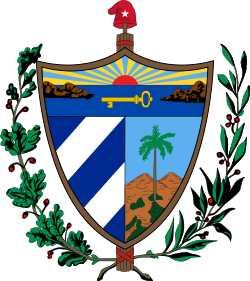History
Cuba's quest for independence began with the ideals in other Spanish American colonies in the 1810s. Initially, because of the dependence of the island upon Spain, loyalty to the colonial regime slowed the development of the independence movement. Dissidents and exiles throughout the Caribbean, Gulf of Mexico, and the Atlantic developed connections and solidarity to plan and launch three wars to end Spanish rule. Spanning thirty years, the Ten Years' War (1868–1878), the Little War (1879–1880) and the Cuban War of Independence (1895–1898) resulted in severing ties with Spain. During this period, though not independent, Cuba drafted the Constitutions of Guáimaro (1869), Baraguá (1878), Jimaguayú (1895), and La Yaya (1897). These constitutions defined Cubans as anyone, regardless of where they were born, who was directly serving Cuba in the insurgency. Each of them, as did subsequent Cuban constitutions until 1992, interchangeably used the terms citizenship and nationality. In 1886, slavery was abolished under the freedmen regulation, but newly freed slaves were required to work for rations and clothing.
The Spanish crown implemented the Civil Code of 1888 and by royal decree extended the code to its colonies. It became effective in Cuba in 1889. The code combined elements of Roman law with patriarchal Catholic ideas on social order, as had France's Napoleonic Code. Under the code, women had no autonomy and could not administer either their own children or property. Article 22, of the 1888 Civil Code provided that a wife must have the same nationality as her husband. It allowed that if the marriage terminated a wife could repatriate by returning to Cuba and establishing residence, registering her choice to reestablish Cuban nationality with the Civil Registrar, and renouncing her foreign citizenship. A foreign wife who had derived citizenship from her Cuban husband could relinquish her nationality if the marriage was terminated by repatriating to her former nationality or acquiring a new nationality. Married women were unable to relinquish their nationality while married. In the last year of the War of Independence, 1898, the United States intervened against Spain, and in the ensuing Spanish–American War, forced Spain to cede its territories of Cuba, Guam, The Philippines, and Puerto Rico to the United States.
During the occupation of Cuba (1898–1902) by the United States, the first constitution for Cuba as an independent state was drafted in 1901. It excluded women from the rights of citizenship. Rather than attempt to devise a new civil code at that time, the Spanish code remained in effect. Under the 1901 Constitution, a child who was legitimate or legitimized born of a Cuban father was a Cuban national, as was a child born to foreign parents in Cuba and who upon reaching majority, registered in the official Cuban registry. In like manner a legitimate or legitimated child born abroad to native Cubans who had lost their nationality could register as a Cuban national when majority was attained. An illegitimate child born anywhere derived the parent's nationality if the parent who first legally recognized it was Cuban. In the case of simultaneous recognition, only the father's nationality was used to determine nationality. Nationality could be lost by receiving employment or honors of a foreign government without approval of the Senate, obtaining other nationality, or leaving the territory for more than five years, unless one was abroad in service to the government. The Constitution of 1911 and the amended Civil Code of 1929 required a foreign woman who married a Cuban husband to derive his nationality, but Cuban women were no longer required to relinquish their nationality upon marriage to a foreigner.
In 1933, Ángel Alberto Giraudy, Alfredo E. Nogueira, and Herminio Portell Vilá, the Cuban delegates to the Pan-American Union's Montevideo conference, signed the Inter-American Convention on the Nationality of Women, which became effective in 1934, without legal reservations. The following year, interim President of Cuba, Carlos Mendieta produced a provisional constitution which granted women suffrage. In Article 13, the Constitution of 1935 also specified that neither marriage or dissolution of a marriage effected the nationality status of a spouse or children, that Cuban women married to foreigners retained their Cuban nationality, and that a foreign woman married to a Cuban man could choose to keep her original nationality or acquire Cuban nationality. The 1940 Constitution of Cuba declared in Article 20 equality under the law for all Cubans and outlawed discrimination based on class, race, sex, or skin color. It specified that naturalized Cubans who returned to their country of birth for three years or more, lost Cuban nationality and reduced the residency requirement for a foreigner married to a Cuban to two years. After a suspension of the constitution between 1952 and 1959, the 1940 Constitution was restored and remained in effect with modifications until adoption of the 1976 Constitution.
